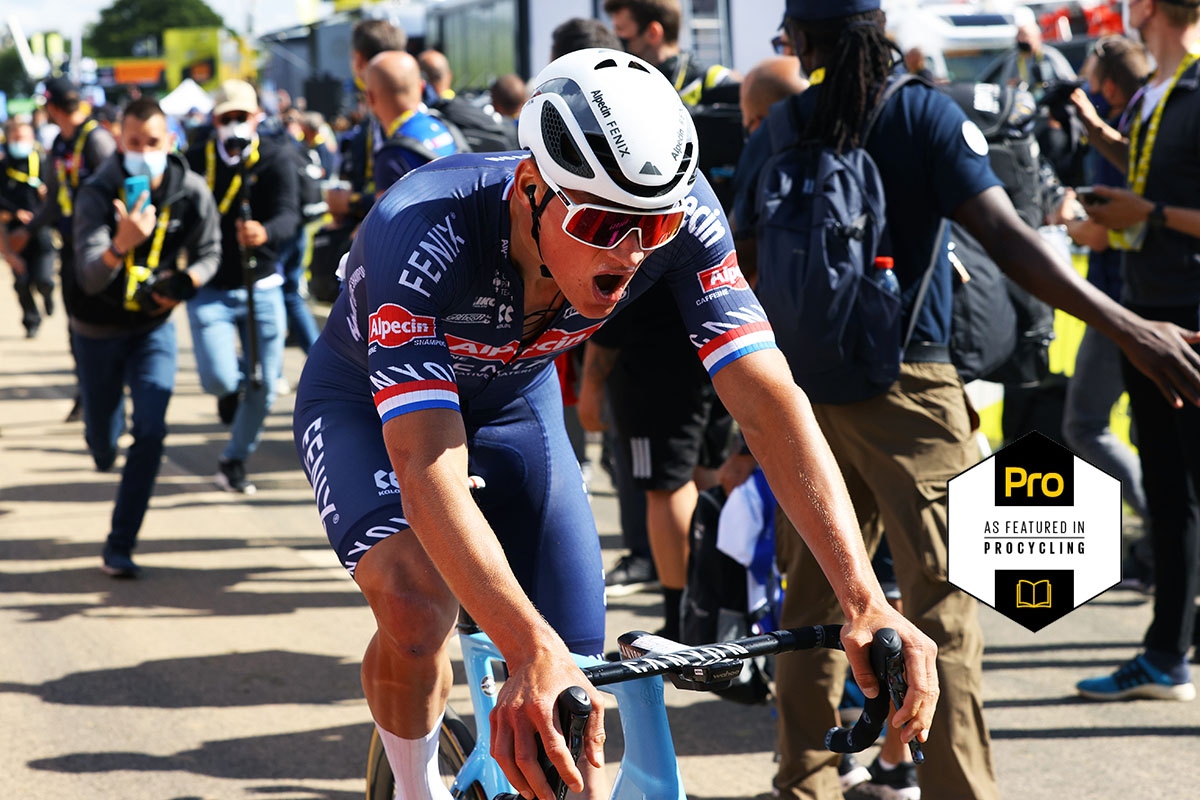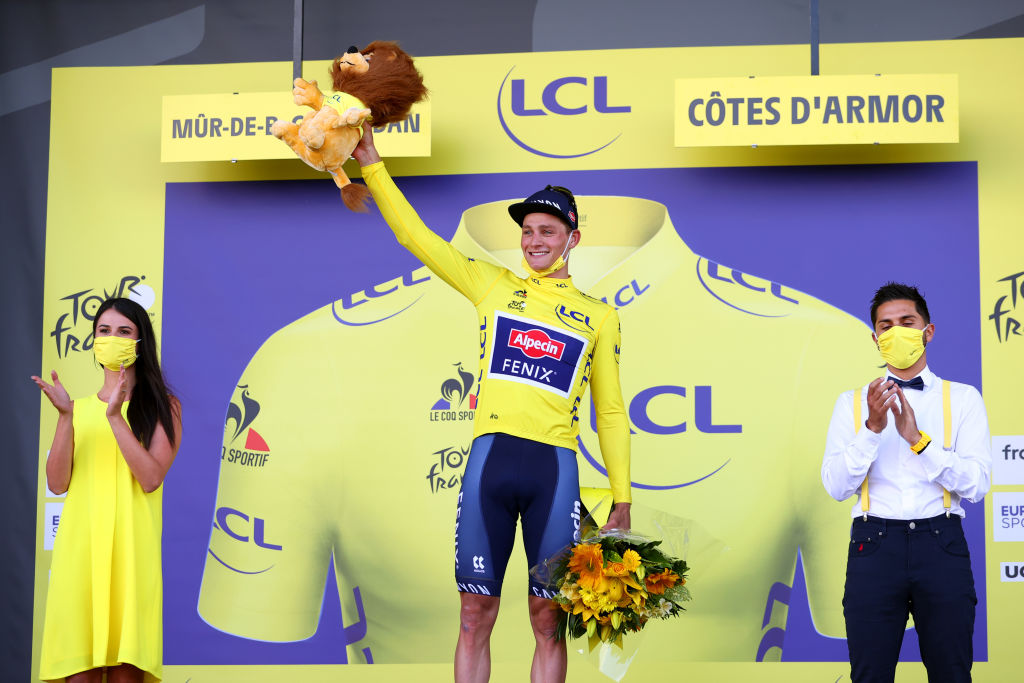Tour de France stage 2: Chaos and control
Mathieu van der Poel imposed himself on the Tour after two crazy days in Brittany

Mathieu van der Poel did it all wrong. Tactically and strategically, his decisions on stage 2 of the 2021 Tour de France looked emotional and hot-headed. His attack the first time up the Côte de Mûr-de-Bretagne achieved nothing, though it did draw out a strong but very temporary counterattack by four more of the GC favourites. When Nairo Quintana attacked the second and final time up, Van der Poel did the chasing. Sonny Colbrelli attacked, and again, Van der Poel did the work of shutting him down.
Van der Poel’s countryman Hennie Kuiper, twice runner-up in the Tour de France, was quoted apocryphally in Tim Krabbé’s The Rider on the subject of energy expenditure: “Racing is licking your opponent’s plate clean before starting on your own.” Van der Poel was offering up his rivals a three-course meal of energy-wasting decisions.
And yet he could still unleash an attack of elemental ferocity even as the race’s defending champion Tadej Pogačar and his shadow Primož Roglič were the only riders capable of following his chase of Colbrelli. Pogačar, who is no stranger himself to upending the Tour de France with acts of cycling violence, didn’t bother following when Van der Poel went, and put it this way: if he could have followed, he would. The rest of the Tour was left in a fight for a very distant second place.
In taking the yellow jersey on the Côte de Mûr-de-Bretagne, Van der Poel did in two days what his late grandfather Raymond Poulidor never managed in 14 Tours. The achievement and the emotional resonance brought Van der Poel to tears, and it brought cycling fans to tears. Van der Poel races with the caps lock on; there is nothing in the way of subtlety, finesse or art. Physiologists may trace his ability to accelerate again even as his body is redlining back to his cyclo-cross efforts, or note that his father and maternal grandfather were both world-class professionals, but what really separated him from everybody else in the peloton at Mûr-de-Bretagne was this: chaos.
Chaos is in the air at the 2021 Tour de France. It is drifting across the race like the sea breezes that blow north east across Brittany from the Atlantic coast, carried on the air like salt. Van der Poel is an agent of chaos; he thrives on it. Same with yesterday’s winner Julian Alaphilippe. It’s not just the racing style of the two yellow jerseys of the race so far. The chaos on stage 1 was literal: crashes, tension and a cardboard sign with a simple greeting to the holder’s grandparents disrupted, discombobulated and inflicted physical pain and injury on the peloton.

The Tour de France is an eternal struggle between control and chaos. This last decade and more, control has won. Modern cycling history is a story of organised, strong teams suffocating the industry and ambition of more aggressive riders and teams, and we all know which team I’m mainly talking about. The chaos is hidden under a thin veneer, but mostly, the Tour is the most controlled race in the world of professional cycling.
But chaos has won so far in this Tour. The contrast between the two competing and conflicting approaches to cycling can be summed up by the conflicting approaches by Van der Poel and the Ineos Grenadiers in the final 25km of today’s stage. Ineos, who have been more responsible than any other team in cycling history for crushing attacking ambition with the cold, hard logic of organisation, physiological superiority and control, rode an absolutely textbook stage. With 23km to go, and the peloton intact, they had a full complement of eight riders in a line on the right hand side of the peloton, at the front. They looked… in control. The fourth-category climb through the village of Mûr-de-Bretagne then the first time up the finishing climb cost them two riders, but they still led the peloton between the final two climbs with a line of six. One by one, their riders led, then peeled off in a slow-motion, long-distance leadout: Van Baarle, Geoghegan Hart, then Kwiatkowski into the final climb, and Porte up it with the two GC leaders Carapaz and Thomas in his wake.
The latest race content, interviews, features, reviews and expert buying guides, direct to your inbox!
But this is the old way. Ineos may have ridden the most efficient and logical race, and maintained an illusion of control. But cracks have appeared, not only in their inability to cope with Van der Poel, but also in Geraint Thomas getting dropped and conceding 23 seconds to the Dutchman and 15 to many of his GC rivals. So far in 2021, chaos has beaten control.
Maybe it’s just Brittany. There are still two more stages to run in France’s most cycling-mad region, but the route will calm down, flatten out and likely favour the sprinters from stage 3. But at the same time, the 2021 Tour has not yet settled. And it is riders who refuse to be constricted by the received wisdom, standard tactics and controlling instincts of establishment cycling who have thrived.
Edward Pickering is Procycling magazine's editor.
Procycling magazine: the best writing and photography from inside the world's toughest sport. Pick up your copy now in all good newsagents and supermarkets, or get a Procycling subscription.
Edward Pickering is Procycling magazine's editor. He graduated in French and Art History from Leeds University and spent three years teaching English in Japan before returning to do a postgraduate diploma in magazine journalism at Harlow College, Essex. He did a two-week internship at Cycling Weekly in late 2001 and didn't leave until 11 years later, by which time he was Cycle Sport magazine's deputy editor. After two years as a freelance writer, he joined Procycling as editor in 2015. He is the author of The Race Against Time, The Yellow Jersey Club and Ronde, and he spends his spare time running, playing the piano and playing taiko drums.